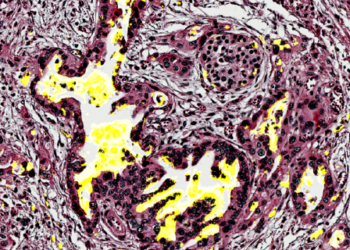Colorectal cancer (CRC) is a major health concern worldwide, characterized by high incidence and mortality rates. Despite advances in treatment, metastatic CRC (mCRC) remains particularly challenging. Immunotherapy has emerged as a promising approach, especially for patients with deficient mismatch repair (dMMR) and microsatellite instability-high (MSI-H) tumors, which show a higher response rate to immune checkpoint inhibitors (ICIs). This paper reviews the current state of immunotherapy in CRC, focusing on its use as first-line treatment, challenges with microsatellite stable (MSS) mCRC, and future directions for research.
Colorectal cancer (CRC) is a major health concern worldwide, characterized by high incidence and mortality rates. Despite advances in treatment, metastatic CRC (mCRC) remains particularly challenging. Immunotherapy has emerged as a promising approach, especially for patients with deficient mismatch repair (dMMR) and microsatellite instability-high (MSI-H) tumors, which show a higher response rate to immune checkpoint inhibitors (ICIs). This paper reviews the current state of immunotherapy in CRC, focusing on its use as first-line treatment, challenges with microsatellite stable (MSS) mCRC, and future directions for research.
The use of immunotherapy as a first-line treatment for mCRC, particularly in patients with dMMR/MSI-H tumors, has gained traction due to favorable outcomes observed in clinical trials. The KEYNOTE-177 phase III trial compared pembrolizumab monotherapy with standard chemotherapy in first-line mCRC patients with MSI-H. Results showed a median progression-free survival (PFS) of 16 months for pembrolizumab compared to 8 months for chemotherapy. Although the overall survival (OS) data did not reach statistical significance, the trend favored pembrolizumab, suggesting it as a potential standard first-line therapy.
In the CheckMate-142 trial, the combination of nivolumab and low-dose ipilimumab was evaluated as a first-line treatment for MSI-H mCRC. The trial reported an objective response rate (ORR) of 60% and a disease control rate (DCR) of 84% after a median follow-up of 13.8 months. These results improved over time, with ORR reaching 69% and complete response (CR) rate increasing to 13% at 29 months, indicating superior efficacy and safety compared to pembrolizumab monotherapy.
Immunotherapy has shown limited success in patients with MSS mCRC, which constitutes the majority of CRC cases. MSS tumors exhibit lower mutational burden and reduced immune infiltration, making them less responsive to ICIs. Current research focuses on identifying biomarkers and combination therapies to enhance the efficacy of immunotherapy in MSS mCRC. For instance, combining ICIs with anti-epidermal growth factor receptor (EGFR) therapy or radiation therapy is being explored to overcome resistance and improve outcomes.
Neoadjuvant and adjuvant therapies are critical for managing early-stage CRC. The ATOMIC study evaluated the efficacy of adjuvant atezolizumab combined with FOLFOX chemotherapy in stage III dMMR/MSI-H CRC patients. Preliminary results indicate that this combination may improve disease-free survival (DFS) compared to FOLFOX alone. Similarly, the NICHE trial demonstrated promising results with neoadjuvant nivolumab and ipilimumab in early-stage colon cancer patients, showing high pathological response rates.
Identifying reliable biomarkers is essential for optimizing immunotherapy in CRC. PD-L1 expression has been extensively studied, but its role as a predictive marker for ICI efficacy in CRC remains unclear. The gut microbiota has emerged as a potential modulator of immunotherapy response, with certain bacterial strains enhancing the antitumor effects of ICIs. Future research aims to better understand the interaction between the microbiota and immune response, and to identify new biomarkers that can predict treatment outcomes.
Immunotherapy has revolutionized the treatment landscape for dMMR/MSI-H mCRC, offering improved outcomes for patients who previously had limited options. However, challenges remain in treating MSS mCRC and optimizing patient selection through biomarkers. Ongoing clinical trials and research efforts are crucial to advancing our understanding and enhancing the efficacy of immunotherapy in all CRC patients. The future of CRC treatment lies in the continued integration of immunotherapy with traditional modalities and the development of personalized therapeutic strategies.
Full text:
The study was recently published in the Exploratory Research and Hypothesis in Medicine.
Exploratory Research and Hypothesis in Medicine (ERHM) publishes original exploratory research articles and state-of-the-art reviews that focus on novel findings and the most recent scientific advances that support new hypotheses in medicine. The journal accepts a wide range of topics, including innovative diagnostic and therapeutic modalities as well as insightful theories related to the practice of medicine. The exploratory research published in ERHM does not necessarily need to be comprehensive and conclusive, but the study design must be solid, the methodologies must be reliable, the results must be true, and the hypothesis must be rational and justifiable with evidence.
Follow us on X: @xiahepublishing
Follow us on LinkedIn: Xia & He Publishing Inc.
Journal
Exploratory Research and Hypothesis in Medicine
Article Title
Immunotherapy in Colorectal Cancer: A Review
Article Publication Date
31-Jan-2024
Discover more from Science
Subscribe to get the latest posts sent to your email.



